........
Heroin - the Mental Roof over your Head -
Links between Homelessness and Drug Use
The report presents findings from research which looked at the links between homelessness and drug use, considered local service providers' policies and practices in relation to these
issues and examined the experience homeless drug users have of homeless services. It involved interviews with homeless drug users and service providers in the greater Tallaght area of Dublin.
Crawley M & Daly M (2003) 'Heroin - the Mental Roof over your Head - Links between Homelessness and Drug Use'. Tallaght Homeless Advice Unit, Dublin (Due for
publication December 2003).

Available soon.
Top
........
You feel you'd have no say - Protestant Communities in Border Areas
This action research was aimed at firstly, identifying the needs, concerns and issues facing minority Protestant communities living in the border area and secondly examining the reasons
for low uptake of the Peace and Reconciliation Programme by these communities. It involved facilitating, analysing and documenting two workshops in each of the four selected
communities and identifying recommendations which will enhance uptake of Peace II by Protestant communities. Click here for a summary of the report (489 kb Doc).
For the detailed research report click here (460 kb Doc)
For the companion report containing feedback from Catholic communities (this presents responses to the research findings elicited in workshops with members of Catholic
communities living along the border ) click here ( 402 kb Doc)
Crawley, M (2003) 'You feel you'd have no say - Protestant Communities in Border Areas', Rural Community
Network NI.

Top
........
The Gender Proofing Handbook
The Gender Proofing Handbook was produced to provide information and practical assistance to those planning to gender proof strategies or development plans. The Handbook provides (1)
an Introduction and background information on the issue; (2) outlines why gender proofing is needed, and (3) suggests how to apply the gender proofing process to objectives and actions.
Crawley, M & O'Meara, L (2002 )'Gender Proofing Handbook', published by the NDP Gender Equality Unit, Dept. of
Justice, Equality & Law Reform, Dublin (Written in both Irish and English).
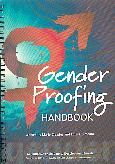
English language version
1. Introduction (click here - 452 kb PDF file)
2. Why gender proof (click here - 261 kb PDF file)
3. How to gender proof (click here - 292 kb PDF file)
4. Bibliography (click here - 58 kb PDF file)
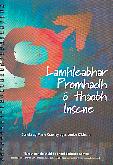
Leagan Gaeilge
1. Réamhrá (Brú anseo - 446 kb PDF)
2. Fáthanna le promhadh ó thaobh Inscne (Brú anseo - 333 kb PDF)
3. Ag tabhairt faoin bPromhadh ó thaobh Inscne (Brú anseo - 324 kb PDF)
4. Leabharliosta (Brú anseo - 70 kb PDF)
Top/Barr
........
Gender Equality in Community Development
This factsheet highlights gender equality issues in the area of community development and in
local and community decision making structures. It presents models of good practice, both national and international and suggests actions to promote gender equality in the area fo
community development. The factsheet was researched and produced as part of a series commissioned by the NDP Gender Equality Unit to assist agencies and organisations
responsible for the implementation of the National Development Plan.
Crawley, M & O'Meara, L (2002) 'Gender Equality in Community Development', published by the NDP Gender
Equality Unit, Dept. of Justice, Equality & Law Reform, Dublin.
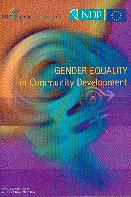
For a copy of this factsheet, click here (2036 kb PDF file)
Top
........
Gender Equality and work with Refugees
This factsheet considers some general issues in relation to refugees and asylum seekers, outlines some gender issues in work with refugees, presents case studies of good practice
and suggests actions which could be implemented by agencies and organisations working with refugees. This factsheet was researched and prodcued as part of a series commissioned
by the NDP Gender Equality Unit to assist agencies and organisations responsible for the implementation of the National Development Plan.
Crawley, M & O'Meara, L (2002) 'Gender Equality and work with Refugees', published by the NDP Gender Equality
Unit, Dept. of Justice, Equality & Law Reform, Dublin.
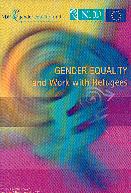
Available soon.
Top
........
Gender Issues in the Peace and Reconciliation Programme (Peace II)
This factsheet outlines the background to the emergence of the Peace Programme, highlights
gender equality issues in the delivery of Peace II, presents examples of good practice from Peace I and other international conflict situations and suggests possible actions to promote
gender equality. The factsheet was researched and produced as part of a series commissioned by the NDP Gender Equality Unit to assist agencies and organisations
responsible for the implementation of the National Development Plan.
Crawley, M & O'Meara, L (2002) 'Gender Issues in the Peace and Reconciliation Programme (Peace II)',published
by the NDP Gender Equality Unit, Dept. of Justice, Equality & Law Reform, Dublin.
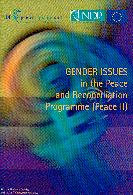
For a copy of this factsheet, click here (1135 kb PDF file)
Top
........
Negotiating the mainstream ...
This paper was published in one of a series of strategy guides aimed at assisting community groups to translate mainstreaming theory into practical actions and to examine various
strategies for mainstreaming. The paper outlines the experiences of a rural women's network in the North of Irealnd in developing and negotiating an effective gender mainstreaming agenda.
In particular, it describes practical actions undertaken, elements of good practice and highlights challenges and concerns around the implications for gender specific work.
Crawley, M. (2000). ‘Negotiating the Mainstream - A Rural Women’s Network Perspective’ Strategies for Mainstreaming, Community Workers Co-operative.
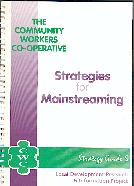
For a complete version of this paper, click here (103 kb PDF file)
Top
........
From Listening Ears to Belly Dancing...
This article provides an insight into the nature of local development work with rural women in the North of Ireland and outlines the benefits of this work to rural communities.
Crawley, M. (1999). ‘From Listening Ears to Belly Dancing’ - Networking - the Fermanagh Way’, Network News, Rural Community Network.

For a complete version of this paper, click here (70 kb PDF file).
Top
........
Networking with Rural Women's Groups - linkages with the P&R Programme.
This paper outlines the effects of the EU Peace and Reconciliation Programme on the development of rural women's groups. It raises questions around the sustainability of these
initiatives and outlines a challenge for Phase II of the EU Programme. It also examines ways in which District Partnerhships could adopt a strategic and inclusive approach to gender in
their work by suggesting practical gender proofing actions.
Crawley, M. (1998). ‘Networking with Rural Women’s Groups and Linkages with the Peace and Reconciliation
Programme’, in Local Development in Ireland - Policy Implications for the Future, Community Workers Co-operative.
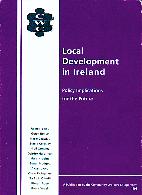
For a complete version of this paper, click here (103 kb PDF file).
Top
........
Women's Networks - the emerging voice in rural communities I
This article considers some of the issues which emerge in linking local community based women's development to initiatives which pursue a policy agenda and in particular, it examines
the challenge in linking local rural women's development to the wider rural development agenda.
Crawley, M. (1997). ‘Women’s Networks - the emerging voice in Rural Communities I’, Network News, Rural Community Network.

For a complete version of this paper, click here (69 kb PDF file).
Top
........
Women's Networks - the emerging voice in rural communities II
This article considers some of the issues which emerge in linking local community based women's development to initiatives which pursue a policy agenda and in particular, it examines
the challenge in linking local rural women's development to the wider rural development agenda.
Crawley, M. (1998). ‘Women’s Networks - the emerging voice in Rural Communities II’, Women’s News, Belfast.
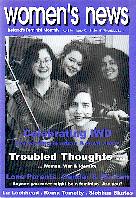
For a complete version of this paper, click here (72 kb PDF file).
Top
........
The Reality of Women's Studies in Community Based Education
This paper explores the position of women's studies in a community education setting, and in particular explores the factors which contribute to many women's reluctance to engage in this
area of study. Recognising its importance in order to raise a critical awareness of gender issues at a local level, this paper suggests ways in which women's studies could be made
more appealing to the majority of women.
Crawley, M. (1996). ‘The Reality of Women’s Studies in Community Based Education’ in ‘ Feminism, Politics, Community’,Ed., Ailbhe Smyth, Women’s Education Research and Resource Centre, University College, Dublin.
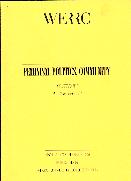
For a complete version of this paper, click here (91 kb PDF file).
Top
|













